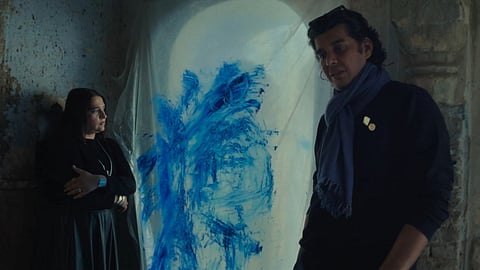
- HOMEGROWN WORLD
- #HGCREATORS
- #HGEXPLORE
- #HGVOICES
- #HGSHOP
- CAREERS
- ABOUT US
- CONTACT US

“What do you want? Money?”
That’s what Raka, the protagonist of the short film Tinctoria asks the spirits trying to haunt her. It's an oddly hilarious question for a supernatural encounter but also a revealing one. It speaks to the world we live in, where everything is assumed to revolve around profit. It’s a line that sums up not just her attitude but the premise of Tinctoria.
The MAMI-select short film, written and directed by Amrita Bagchi, revolves around modern-day affluenza — an affliction of the privileged, numbed by entitlement and unbothered by consequence. In Tinctoria, meaning is manufactured, and heritage is curated to fit a mood board. The past is valuable only if it can be repurposed into something fashionable. And legacy is nothing more than a brand strategy designed to propel your name further, disconnected from the blood upon which it was built.
The film follows Raka, a fashion designer preparing for her new show, staged in her great-grandfather’s now-defunct indigo factory. Once seen as a symbol of innovation and industry, the factory is now in ruins. But to Raka, it’s a creative opportunity; a mise-en-scène that can be rebranded. Her approach is clinical, efficient and cold. The concerns of the workers preparing for the show don’t figure into her calculations. When there are only 10 cartons of drinking water available, she demands 9 to be poured into a dried up fountain for ambience. When she needs assistance for fittings behind the stage, Raka casually asks the tailor's granddaughter to hold safety pins in her mouth.
The air is heavy with this hierarchy and disregard for people from the very beginning. A sense of class superiority hums beneath the surface. The workers are bodies to move things. The show is everything. The brand must speak louder than the people building it.
But the story doesn’t stay in this world for long. As the preparations continue, the past begins to seep in; first through subtle moments, then through more violent ruptures. The teleprompter flashes mysterious images. The set seems to shift. And Raka, once composed and dismissive, finds herself pulled back into memories that aren’t hers, but might as well be. The indigo empire her family built came at a cost. Workers died in unimaginable conditions; forced to wear iron shackles to keep them awake, their sweat collected in cups around their necks because there wasn’t enough drinking water.
It’s through these visions, some brief, others more sustained, that Tinctoria reveals its true intent. This is a film about inherited violence and the cost of looking away; the sins of the ancestors. The colour indigo dominates every frame becoming the film’s anchor. It stains the walls, the clothes, the air. It’s vibrant and stunning, but also a constant reminder of labour, exploitation, and erasure.
Shot entirely on an iPhone, the film approaches horror tastefully which feels appropriate for this story. Jumpscares and paranormal nightmares fall short to the terror man puts another man through. The visual sequences in the film are potent with metaphors and intimations of cruelty. Yet, the hallucations and astral distortions feel not vindictive, just purging.
By the end, Raka is no longer the same. Her journey isn’t framed as redemption, exactly; it’s more of a reckoning. The world she tried to control pulls her under, forcing her to confront what her family built, and who paid the price. Through its sincere storytelling, Tinctoria becomes as much a social-crique as it does an excercise in empathy.
Follow Amrita Bagchi here & watch the short film at the top of the page.
If you enjoyed reading this, here's more from Homegrown:
The Un-Model Minority: Poorna Jagannathan On Deli Boys' Subversive South Asian Vision
Equality & Justice For All: Watch A 2000s Biopic Depicting Dr Ambedkar’s Revolution
A Homegrown Documentary Captures The Loss Of Koli Community's Connection With The Sea
